"المعرفة قوة."
لقد سمعنا جميعًا شخصًا ما يقولها أو قرأنا هذه المقولة على الإنترنت. إنها مقولة مبتذلة، ولكن لسبب وجيه.
مع قيام المؤسسات بتوليد كمية هائلة من البيانات - مقاطع الفيديو التدريبية ووثائق الشركة ومعلومات العملاء ومقالات مركز المساعدة عبر الإنترنت - بشكل يومي، فإن الحفاظ على تنظيم هذه المعلومات وإتاحتها بسهولة أمر بالغ الأهمية.
في الاقتصاد الحالي القائم على المعرفة، فإن فهم كيفية تبسيط المعلومات المتاحة لك واستخدامها بشكل جيد هو قوة حقيقية.
ومع ذلك، غالبًا ما تهدر المؤسسات أموالها من خلال عدم امتلاك الأدوات أو العمليات المناسبة لإنشاء المعرفة المؤسسية وإدارتها ومشاركتها مع عملائها وموظفيها.
_أدخل برنامج قاعدة المعرفة!
ما هي برمجيات قاعدة المعرفة؟
برنامج قاعدة المعرفة هو أداة تجمع كل معارف شركتك والمعلومات المتعلقة بالمشروع في مركز مركزي لسهولة التخزين والإدارة.
وبهذه الطريقة، يمكن لجميع الأطراف المعنية الوصول إلى أي معلومات يحتاجونها ومشاركتها بسهولة ويسر.
يمكن لكل من موظفيك وعملائك استخدام نظام إدارة المعرفة . يمكن للموظفين الجدد استخدام المستودع لمعرفة المزيد عن مؤسستك ومنتجاتها (قاعدة المعرفة الداخلية) بينما يمكن للعملاء الجدد استخدامه للعثور على حلول سريعة لاستفساراتهم دون الحاجة إلى الاتصال بدعم العملاء (قاعدة المعرفة الخارجية).
إليك هذا البحث الذي سيذهلك بالتأكيد:
44% من الموظفين يعانون من ضعف أو ضعف شديد في نقل المعرفة، وفقًا لـ إرنست ويونغ .
هذا ليس أسوأ ما في الأمر. ينفق الموظفون 7-20% من ساعات عملهم في تكرار الحلول الحالية للآخرين.
إذا كانت هذه الإحصائيات تشير إلى أي شيء يمكن الاعتماد عليه، فمن الواضح تمامًا أن المؤسسات في حاجة ماسة إلى الأدوات التي يمكن أن تساعدها إدارة وقتهم بشكل أفضل والبيانات المتزايدة باستمرار، بالإضافة إلى التخلص من التكرار في العمليات.
سيكشف بحث سريع على Google عن أفضل برامج قواعد المعرفة عن عشرات وربما مئات النتائج. كيف يفترض بك تحديد برنامج قاعدة المعرفة المناسب لفريقك؟
نحن هنا لمساعدتك. لقد بحثنا في الإنترنت، وقلبناه رأساً على عقب (حرفياً!)، واخترنا 10 من أفضل أدوات قاعدة المعرفة التي يمكنك استخدامها في عام 2024.
## أفضل 10 أدوات برمجية لقاعدة المعرفة في عام 2024
1. انقر فوق 
قم بالتنظيم والتعاون والكتابة والتحرير وتعيين المهام والتعليق والمزيد باستخدام ClickUp Docs
ستندهش إذا لم نصنف أنفسنا كبرنامج القاعدة المعرفية رقم 1، أليس كذلك؟
ClickUp عبارة عن منصة إنتاجية شاملة تحتوي على جميع الأساسيات الداخلية أو فريق عمل عن بُعد لتخزين عملهم وتصوره وتنظيمه.
إنه المركز الذي تجتمع فيه الفرق لتخطيط العمل وتنظيمه والتعاون في العمل باستخدام المهام, مستندات ClickUp , دردشة , الأهداف , اللوحات البيضاء والمزيد
لذا، نعم، ClickUp ليس مجرد أداة رائدة في إدارة المشاريع ؛ وهي أيضًا أداة قاعدة معرفية تستحق وزنها ذهبًا.
وأفضل ما في الأمر هو أنه يمكنك استخدامها كقواعد معرفية داخلية وخارجية قابلة للبحث، أو يمكنك استخدامها لتحل محل جميع أدوات الإنتاجية الخاصة بفريقك!
الميزات الرئيسية لـ #### ClickUp
- تخزين المستندات في نفس مكان عملك. نظرًا لأنه يتم تخزين كل مستند من هذه المستندات جنبًا إلى جنب مع المشاريع ذات الصلة، يسهل الوصول إليها جميعًا
- الاستفادة من ClickUp AI لإدارة معرفية مبسطة. باستخدام ClickUp Brain، يمكنك تحسين قاعدة معارفك دون عناء من خلال تصنيف المعلومات ووضع علامات عليها وتنظيمها تلقائيًا.
- اربط أي شيء معًا باستخدام ميزة العلاقات. الارتباط بالمستندات والمهام من داخل مستند آخر لمساعدتك في الإحالة المرجعية للموارد في أي مكان تحتاج إليه
- أضف صفحات متداخلة في المستندات لتنظيم المحتوى. بدلاً من تجميع كل شيء في مستند واحد، ما عليك سوى تقسيمه إلى صفحات فرعية أصغر متداخلة داخل المستند الرئيسي
- قم بأرشفة المستندات بدلاً من حذفها. بينما سيتم إخفاء المستندات المؤرشفة تلقائياً، إلا أنها تظل محفوظة حتى تتمكن من العثور عليها في وقت لاحق
- استخدام تنسيق النص المنسق: تنظيم كتل كبيرة من النصوص باستخدام تنسيقات مثل قوائم التبديل والخلفيات الملونة والأعمدة
- تخصيص حقوق الوصول إلى المستند. عزز إجراءات الأمان من خلال حماية مستنداتك من التعديلات غير المرغوب فيها. ما عليك سوى تشغيل خيار حماية هذه الصفحة وإضافة سياق لجمهورك
- مصمم مسبقًاقوالب قاعدة المعرفة. استخدمقالب قاعدة المعرفة الخاص بـ ClickUp للبدء.
استخدم هذا القالب لإنشاء إطار عمل لفريقك لتنظيم مكتبة رقمية للمعلومات
ClickUp الايجابيات
- مرن وقابل للتخصيص
- واجهة سهلة الاستخدام مع واجهة سهلة الاستخدام عبر الإنترنت ووضع عدم الاتصال بالإنترنت
- تعيين التعليقات داخل المستندات للتأكد من عدم تفويت أعضاء الفريق لعناصر العمل
- إدارة قاعدتك المعرفية باستخدامتطبيقات الأجهزة المحمولة لنظامي iOS و Android
- تطبيق العلامات للتصفية والعثور على المستندات التي تبحث عنها بشكل أسرع
يتكامل مع العديد من برامج الجهات الخارجية مثلمايكروسوفت تيمزوجيرا، وسلاك، وزوهو، والمزيد
كليك أب سلبيات
- منحنى التعلم بسبب عدد الميزات المتاحة ومستوى قابلية التخصيص
- لا تتوفر جميع طرق العرض على تطبيق الجوال (حتى الآن!)
تسعير #### ClickUp
- مجاني للأبد
- غير محدود: 7 دولارات لكل مستخدم شهريًا
- للشركات: 12 دولارًا لكل مستخدم شهريًا
- المؤسسات: اتصل ب ClickUp للتسعير المخصص
- يتوفر ClickUp Brain على جميع الخطط المدفوعة مقابل 5 دولارات لكل عضو في مساحة العمل شهريًا
ClickUp تقييمات العملاء
- G2: 4.7/5 (أكثر من 4,800 تقييم)
- Capterra: 4.7/5 (أكثر من 3,100 تقييم)
2. Document360
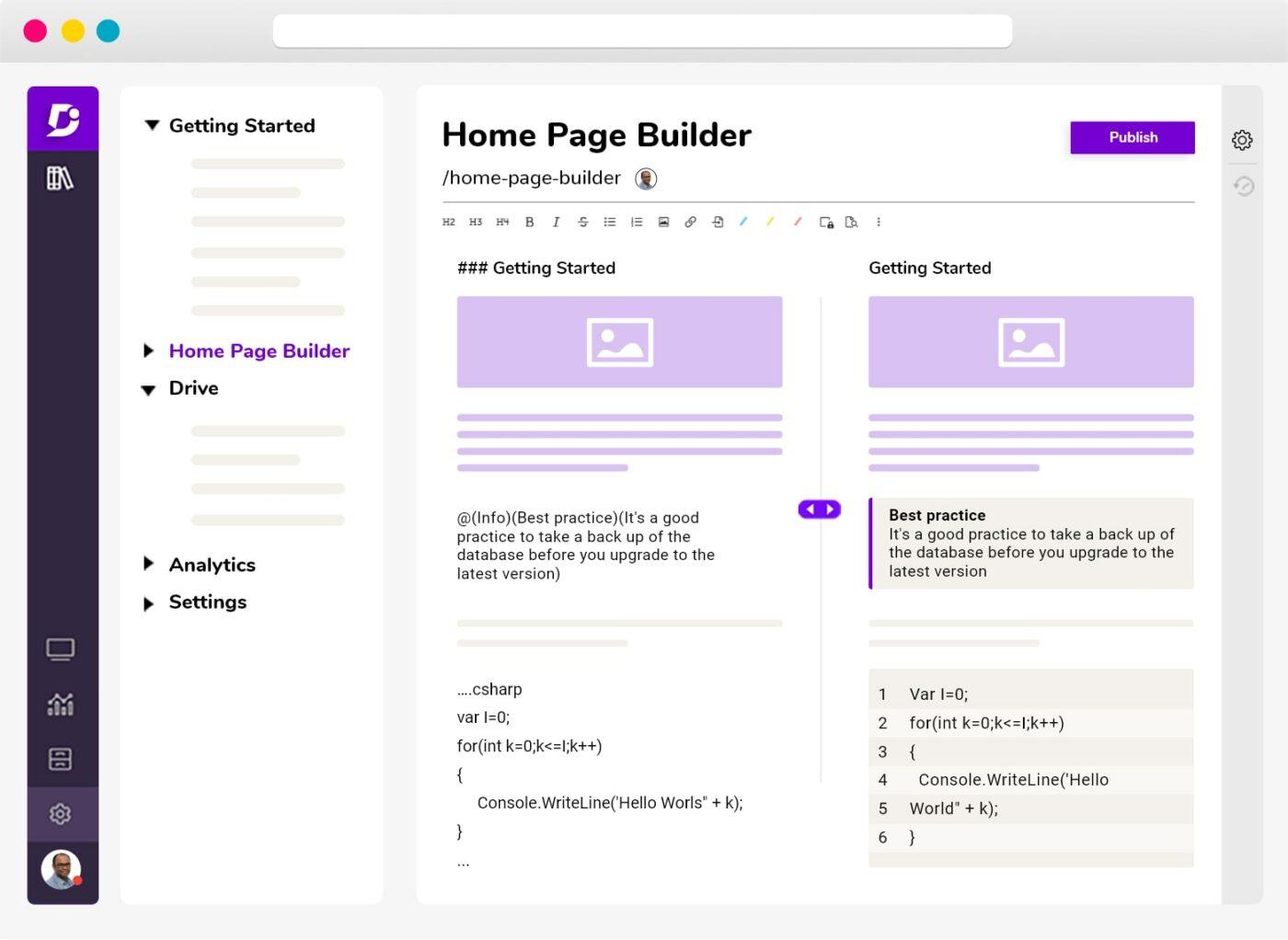
عبر المستند 360 Document360 هو برنامج قوي لقاعدة المعرفة مناسب للشركات الناشئة وفرق العمل المتنامية والشركات التجارية.
على الرغم من بساطة وسهولة البدء في استخدامه، يقدم Document360 مجموعة واسعة من الميزات التي تتيح لك إنشاء قاعدة معرفية بخطوات بسيطة.
بشكل عام، إذا كان بإمكانك استيعاب السعر ولا تحتاج إلى حل لخدمة العملاء، فسيكون هذا خيارًا رائعًا لفريقك.
Document360 الميزات الرئيسية
- اختر من بين محرر تخفيض السعر ومحرر WYSIWYG
- وظيفة بحث قوية تطابق المصطلحات مع الحوادث السابقة للحصول على نتائج أفضل
- دعم متعدد اللغات لتوفير المعلومات ذات الصلة لعملائك العالميين
- تكوين قاعدتك المعرفية في الوضع العام أو الخاص أو المختلط
- تخصيص الصفحات المقصودة لتعكس إرشادات علامتك التجارية
Document360 الإيجابيات
- واجهة سهلة الاستخدام وبديهية
- يتكامل مع أدوات التعاون الجماعي القوية مثل Slack وMicrosoft Teams وIntercom
- يعمل مع كل من قواعد المعرفة الداخلية والخارجية
- تقارير وتحليلات ممتازة
- عرض السجل بين إصدارات متعددة من المقالات، أو الرجوع إلى إصدار سابق دون أي ضجة
Document360 السلبيات
- باهظ الثمن
- يمكن تحسين وظائف البحث
سعر Document360
- بدء التشغيل: 119 دولارًا شهريًا (إذا كانت الفواتير شهرية)
- الشركات: 299 دولارًا شهريًا (إذا كانت الفواتير شهرية)
- المؤسسات: 599 دولارًا شهريًا (إذا كانت الفواتير شهرية)
Document360 تقييمات العملاء
- G2: 4.7/5 (أكثر من 200 تقييم)
- Capterra: 4.7/5 (أكثر من 11 تقييمًا)
تحقق من هذه
_/مرجع/ مدونة؟ ص=11355555 بدائل المستندات 360*Document360 %/%href/*
!
3. مساعدة

عبر هيلب جوس Helpjuice هو برنامج مجاني لإدارة المعرفة تستخدمه آلاف الشركات لإنشاء مقالات الدعم وتنظيمها. وهو يدعم احتياجات العمل متعددة اللغات ويأتي مع مجموعة متنوعة من خيارات إعداد التقارير والتحليلات. إنه أيضًا أغلى قليلاً من الأدوات الأخرى في هذه القائمة، لذلك قد لا تحصل على صفقة رائعة مع Helpjuice.
الميزات الرئيسية ل Helpjuice
- الحصول على تحليلات متقدمة حول كل فريق في قاعدة المعرفة الداخلية الخاصة بك
- وضع علامة تجارية لمقالات قاعدتك المعرفية بأي طريقة تريدها
- محتوى تفاعلي لاستكشاف الأخطاء وإصلاحها بناءً على أسئلة متعددة
- التعاون المتقدم في الوقت الفعلي، بما في ذلك القدرة على النسخ واللصق من MS Word
- عمليات تكامل مثل Slack وOlark وZapier لاتصالات غير محدودة مع أدوات أخرى
إيجابيات Helpjuice
- وظيفة بحث قوية تشبه جوجل
- محرر سهل الاستخدام مع خيارات WYSIWYG وخيارات تخفيض السعر
- يتكامل مع مجموعة من الأدوات مثل Slack وZapier وTeams
- ميزات التعاون، بما في ذلك ميزة التعليق المباشر
- توطين/لغات متعددة
سلبيات Helpjuice
- لا يوجد خيار لاستيراد مستندات وورد أو ملفات PDF أو XLS أو PPTs
- لا يوفر علامات تجارية متعددة
- لا يوجد نظام مجلدات أو مدير ملفات للصور وملفات الوسائط الأخرى
تسعير Helpjuice
- البداية: 120 دولار (حتى 4 مستخدمين)
- التشغيل الإضافي: 200 دولار (حتى 16 مستخدمًا)
- بريميوم محدود: 289 دولارًا (حتى 60 مستخدمًا)
- بريميوم غير محدود: 499 دولارًا (عدد غير محدود من المستخدمين)
تقييمات عملاء Helpjuice
- G2: 4.2/5 (9 تقييمات)
- كابيترا: 4.7/5 (أكثر من 80 تقييمًا)
تحقق من هذه
_/مرجع/ /مدونة؟ p=108693 بدائلالعصيرالمساعد *%/%href/_
!
4. قاعدة المعرفة ProProfs
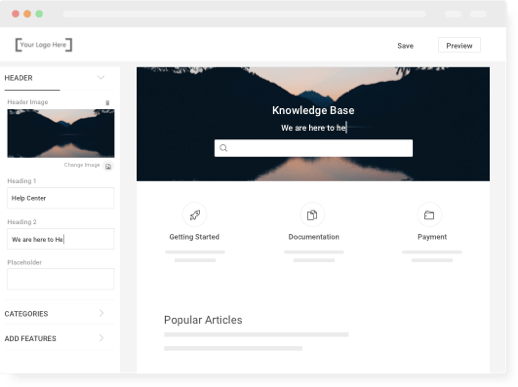
عبر قاعدة المعرفة ProProfs أحد أفضل برامج قاعدة المعرفة التي يمكنك الحصول عليها الآن هو ProProfs Knowledge Base.
بخلاف حقيقة أنها مجانية، فهي أيضًا مكدسة تمامًا في قسم الوظائف. بالإضافة إلى ذلك، لا تحتاج إلى أي مهارات ترميز لاستخدام الأداة. ونعم، إنها تفعل ما يفعله الأساتذة الحقيقيون: تقدير الأشياء!
أوه، وهل ذكرت أن قاعدة معارف ProProfs تأتي مع أكثر من 40 نموذجًا مختلفًا يمكنك استخدامها على راحتك؟
الميزات الرئيسية لقاعدة معارف ProProfs Knowledge Base
- حقوق وصول قابلة للتخصيص
- ضوابط كلمة المرور والخصوصية للحفاظ على أمان المحتوى الخاص بك
- يحتوي على الكثير من عمليات التكامل للحصول على وظائف إضافية
- رؤى تفصيلية، بما في ذلك درجات سهولة قراءة المحتوى الخاص بك
- يدعم أكثر من 90 لغة
إيجابيات قاعدة معارف ProProfs المعرفية
- محرر يشبه محرر MS Word لمساعدتك في كتابة المحتوى وتحريره أثناء التنقل
- تخصيصات لتخصيصقاعدة المعرفة أو الويكي لاحتياجاتك الخاصة
- نظام تقارير قوي يشارك رؤى مفيدة حول أداء المقالات وأنشطة المؤلفين
- يعمل عبر أجهزة ومتصفحات متعددة
- يمكن استخدامه من قبل كل من المبتدئين والخبراء
سلبيات قاعدة معارف بروبروفس المعرفية
- ليس الخيار الأفضل للفرق التي تبحث عن خيارات التحرير المشترك
- معظم الميزات المفيدة غير متوفرة في الباقة المجانية
- تتطلب المجموعة الكاملة من الميزات المزيد من الوقت للتعلم
تسعير قاعدة معارف ProProfs المعرفية
- مجاني
- الأساسيات: 30 دولارًا أمريكيًا/مؤلف شهريًا (تُدفع سنويًا)
- القسط: 40 دولارًا أمريكيًا/المؤلف شهريًا (يتم دفعها سنويًا)
- المؤسسات: اتصل ب ProProfs للحصول على أسعار مخصصة
تقييمات عملاء قاعدة معارف ProProfs المعرفية
- G2: 4.6/5 (أكثر من 20 تقييمًا)
- كابيترا: 4.6/5 (أكثر من 20 تقييمًا)
5. فريش ديسك
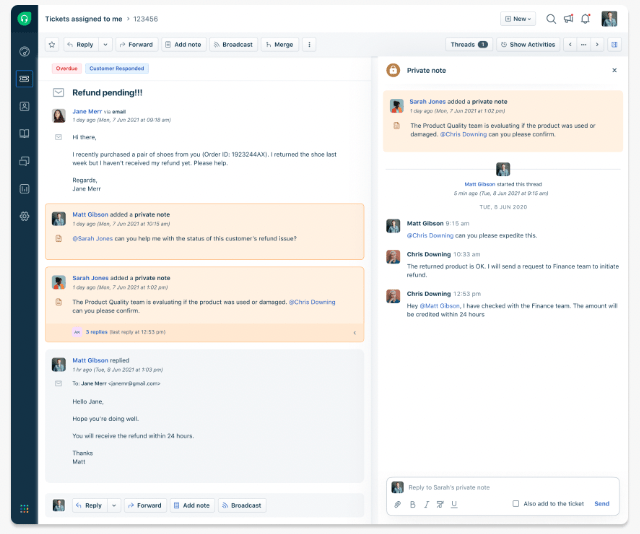
عبر فريش ديسك Freshdesk هي أداة رائدة لدعم العملاء مع وظائف برمجية قوية لإدارة المعرفة.
إذا كان لديك فريق عمل كبير، يمكنك استخدام مهام سير عمل الموافقة على الأداة لإنشاء محتوى عالي الجودة خالٍ من الأخطاء.
ومع ذلك، نظرًا لأن Freshdesk موجه نحو دعم العملاء، فقد لا تكون ميزات قاعدة المعرفة الداخلية الخاصة به مفيدة جدًا.
لذا، هل يمكن لهذه الأداة حقًا أن تبث بعض الهواء الجديد في قاعدة المعرفة الخاصة بك؟
حان الوقت لمعرفة ذلك..
الميزات الرئيسية ل Freshdesk
- واجهة سهلة الاستخدام
- قدرات تحسين محركات البحث المدمجة
- تخزين غير محدود، حتى في الإصدار المجاني
- إنشاء وإدارة إصدارات متعددة من نفس المستند في قاعدة المعرفة الخاصة بك
- نشر المحتوى في شكل صور أو مقاطع فيديو أو أي تنسيق آخر
إيجابيات Freshdesk
- روبوتات مدعومة بالذكاء الاصطناعي التوصية بالمقالات المناسبة للمساعدة السريعة
- منتدى مجتمعي حيث يمكن للعملاء مناقشة المشاكل والحصول على حلول فورية
- إمكانيات متعددة اللغات بحيث يمكنك تلبية احتياجات الجمهور العالمي
- أداة المساعدة الاستباقية التي تعرض تلقائيًا الأسئلة الشائعة ونماذج الاتصال
سلبيات Freshdesk
- الميزات المتقدمة مثل سير العمل وإصدار الإصدارات متوفرة فقط في الباقات المميزة
- يتم تقديمها كجزء من مجموعة دعم العملاء، مما يعني أنه يجب عليك دفع المزيد، حتى لو كان كل ما تريده هو حل إدارة المعرفة
تسعير #### Freshdesk
- مجاناً (حتى 10 وكلاء)
- النمو: 15 دولارًا للوكيل شهريًا (تُدفع سنويًا)
- الإحترافية: 49 دولارًا للوكيل شهريًا (تُدفع سنويًا)
- المؤسسة: 79 دولارًا للوكيل شهريًا (تُدفع سنويًا)
تقييمات عملاء Freshdesk
- G2: 4.4/5 (أكثر من 2,600 تقييم)
- Capterra: 4.5/5 (أكثر من 2,500 تقييم)
ذات صلة:_
_/مرجع/ /مدونة؟ p=106705 أفضل 10 بدائل ومنافسين ل Freshdesk %/%href/_
6. زندسك

عبر زندسك _Zendesk? فريش ديسك؟
هل يشعر أي شخص آخر بشعور "الرجل العنكبوت الذي ينظر إلى نفسه في المرآة"، أم أنا فقط؟
وبغض النظر عن ذلك، فإن Zendesk هو برنامج شهير لإدارة المعرفة موجود منذ عام 2007. باستخدام هذه الأداة، يمكن للعملاء حل استفساراتهم بسهولة من خلال الوصول إلى قاعدة بيانات الأسئلة المتداولة وقتما يريدون.
مثل Freshdesk، يقدم Zendesk نظام إدارة المعرفة الخاص به كجزء من مجموعة دعم العملاء.
نظرًا لأنه قديم، فقد لا يكون أنيقًا مثل أدوات قاعدة المعرفة الجديدة الأخرى.
ومع ذلك ، إليك بعض الميزات الكلاسيكية التي تجعله من بين أفضل برامج قاعدة المعرفة اليوم.
الميزات الرئيسية لـ Zendesk
- سمات قابلة للتخصيص
- واجهة نظيفة وسهلة الاستخدام
- ترجمة قاعدتك المعرفية إلى أكثر من 40 لغة مختلفة
- إدارة المحتوى القابل لإعادة الاستخدام وتحديثه عبر المقالات
- دع الوكلاء يحافظون على تحديث مركز المساعدة الخاص بك مع خيارات النشر الجماعي
- كاملالتكامل مع مجموعة Zendesk من الأدوات، مثلالدردشة المباشرة ومكتب المساعدة (راجعبدائل ServiceNow)
Zendesk الايجابيات
- اقتراحات مدعومة بالذكاء الاصطناعي للتحقق مما يعمل بشكل جيد وما لا يعمل بشكل جيد
- يمكنك معاينة التخصيصات قبل النشر النهائي
- يأتي مع روبوت دردشة مدمج يسمى روبوت الإجابة للمساعدة في العثور على الإجابات الصحيحة في الدردشة المباشرة
سلبيات Zendesk
- يمكنك إنشاء مركز مساعدة واحد فقط في خطته الأساسية
- لا يقدمون حلاً مستقلاً لإدارة المعرفة
تسعير #### Zendesk
- الفريق: 49 دولارًا للوكيل شهريًا (تُدفع سنويًا)
- النمو: 79 دولارًا للوكيل شهريًا (تُدفع سنويًا)
- احترافي: 99 دولارًا أمريكيًا للوكيل شهريًا (تُدفع سنويًا)
- المؤسسات: 150 دولارًا للوكيل شهريًا (تُدفع سنويًا)
تقييمات عملاء Zendesk
- G2: 4.3/5 (أكثر من 5,000 تقييم)
- Capterra: 4.4/5 (أكثر من 3,100 تقييم)
7. هبسبوت
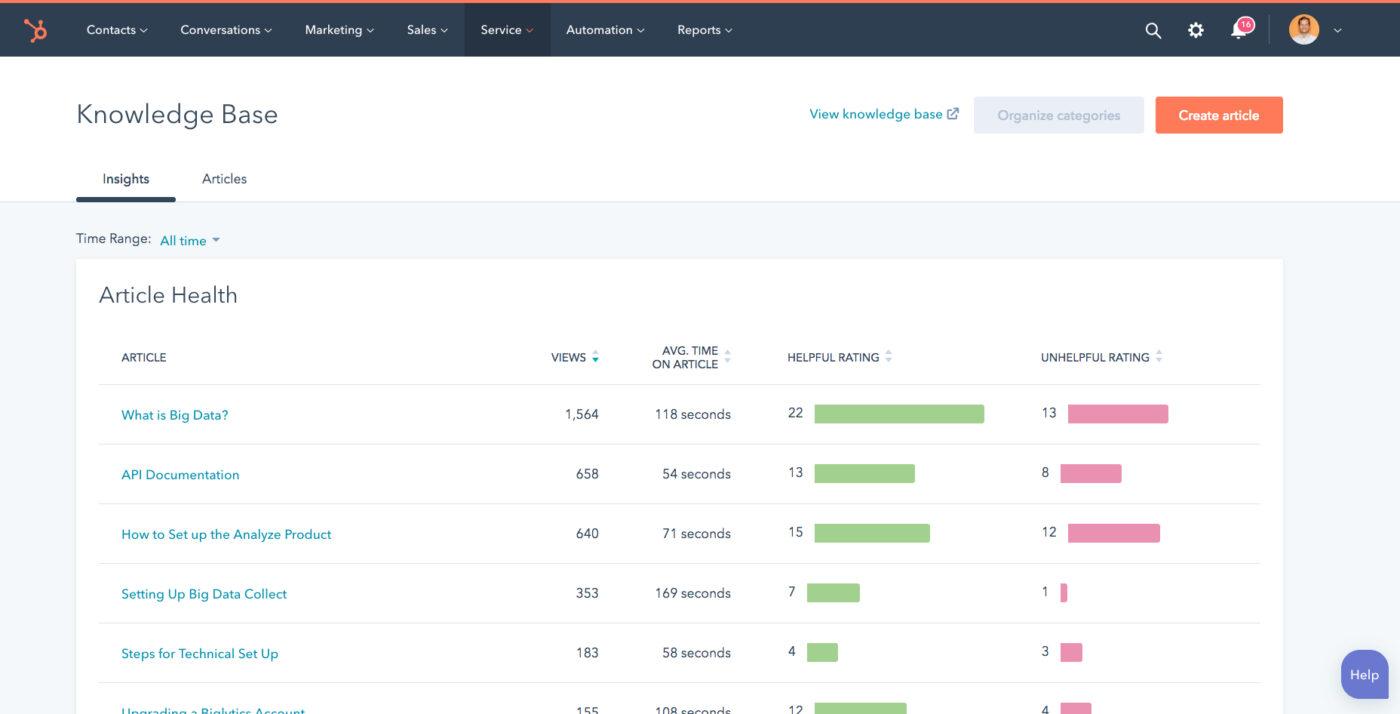
عبر هبسبوت Hubspot أداة ممتازة أخرى لنظام قاعدة المعرفة. يكمن جمال استخدام هذه الأداة في أنها تتيح لك إنشاء مكتبة قوية من المعلومات ومقالات مركز المساعدة بناءً على أسئلة عملائك الأكثر شيوعًا.
نظرًا لأنه مُحسَّن لعمليات البحث المتقدمة، يساعدك Hubspot أنت ووكلاء الدعم لديك في الوصول إلى الإجابة الصحيحة بسرعة وكفاءة.
ميزات Hubspot الرئيسية
- لوحة تحكم مدمجة لإعداد التقارير لقياس تأثير صفحاتك
- خيارات متعددة للعلامات التجارية والتخصيص
- أداة إدارة علاقات العملاء التي تحدد تلقائياً مقالات الدعم التي تم عرضها أو فتحها من قبل العملاء
إيجابيات Hubspot
- عمليات تكامل Hubspot القوية
- قابل للتطوير للشركات المتنامية
- واجهة سهلة الاستخدام وبديهية
سلبيات Hubspot
- قابلية التخصيص ليست مرنة مثل الخيارات الأخرى في هذه القائمة
- أبلغ المستخدمون مؤخرًا عن حالات من الأخطاء و/أو الأعطال
- باهظ الثمن إلى حد ما بالنظر إلى محدودية ميزاته
تسعير هابسبوت
- المبتدئين: 45 دولارًا شهريًا (يشمل 2 مستخدمين مدفوعين)
- محترف: 450 دولارًا شهريًا (يشمل 5 مستخدمين مدفوعين)
- المؤسسات: 1200 دولار شهريًا (يشمل 10 مستخدمين مدفوعين)
تقييمات عملاء Hubspot
- G2: 4.4/5 (أكثر من 1,400 تقييم)
- Capterra: 4.5/5 (أكثر من 3,000 تقييم)
تحقق من هذه
_/مرجع/ /مدونة؟ p=127403 بدائل هاب سبوت *%/%href/_
!
8. مكتب زوهو
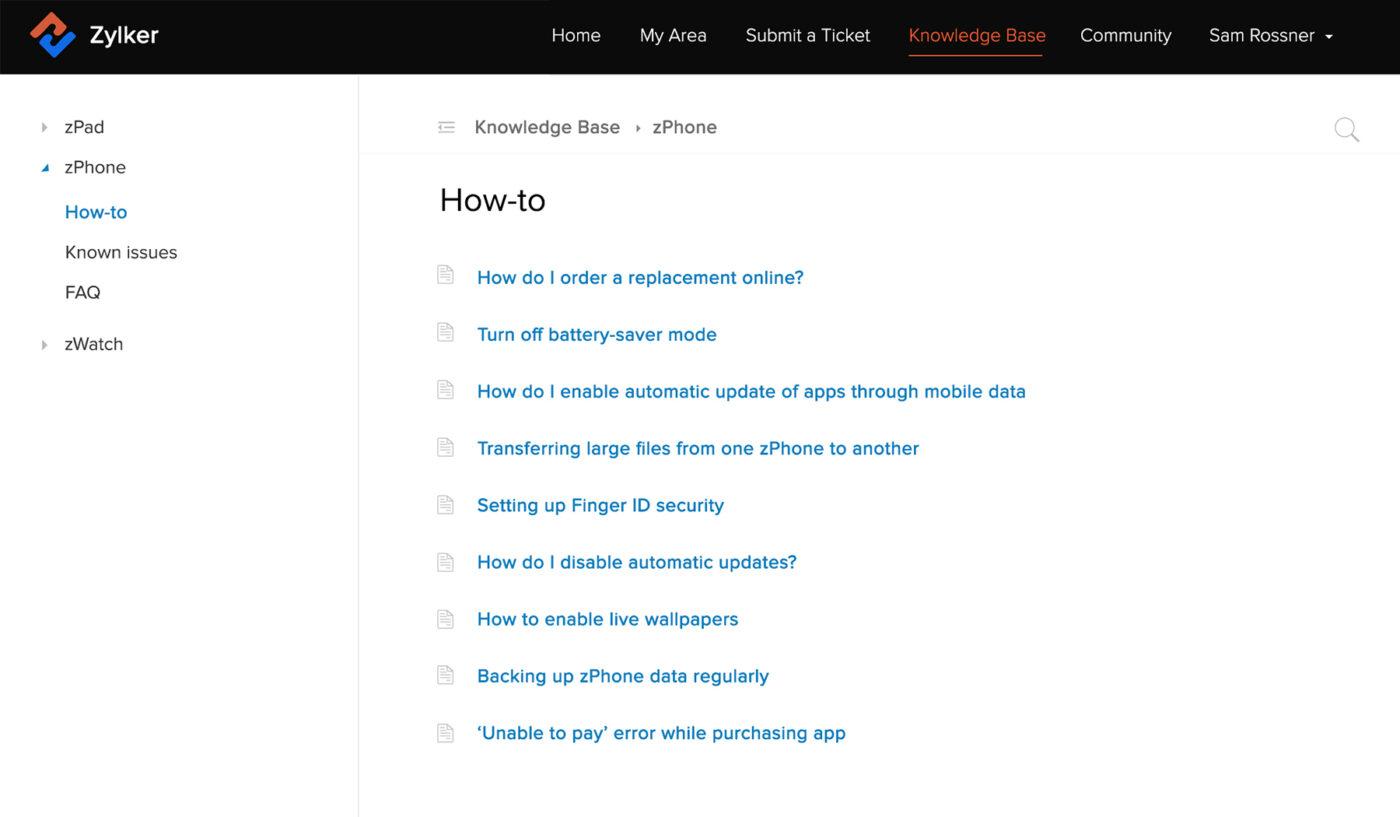
عبر مكتب زوهو Zoho Desk هو في الأساس حل مكتب مساعدة يوفر أيضًا إمكانات الخدمة الذاتية. وباعتباره أحد أفضل برامج القواعد المعرفية المتاحة، تتيح لك الأداة تخصيص كل عنصر من عناصر مركز المساعدة حسب ذوقك باستخدام HTML و CSS.
_أفضل جزء؟
يدعم Zoho Desk المنتديات والمجتمعات، مما يمنح جمهورك منصة مركزية لمشاركة الأفكار وطرح الأسئلة.
الميزات الرئيسية لـ Zoho Desk
- معزز الإنتاجية لوكلاء الدعم
- التعاون على مستوى الشركة
- استخدام العناوين الوصفية والكلمات الرئيسية لتحسين محرك البحث
- السماح للمستخدمين بإرسال التذاكر من داخل نظام قاعدة المعرفة
- التحكم في وصول المستخدم إلى مركز المساعدة الخاص بك وضمان أمان من الدرجة الأولى
- إعداد مجال مخصص لمركز المساعدة الخاص بك
- الاقتراح التلقائي للمقالات ذات الصلة ومساعدة الوكلاء على حل التذاكر بشكل أسرع.
إيجابيات Zoho Desk
- يتكامل جيدًا مع Jira وSlack وG-Suite وغيرها الكثير
- تسمح لك القوالب والتخطيطات المُعدَّة مسبقًا بتخصيص مركز المساعدة الخاص بك بسهولة
مساعده المدعوم بالذكاء الاصطناعي قادر على اكتشاف المشاعر لمساعدة الوكلاء بسهولة ومناسبةإدارة التذاكر
سلبيات Zoho Desk
- مساحة تخزين محدودة لكل مستخدم حتى في الباقة المميزة
- ليس مثاليًا للفرق الكبيرة
أسعار زوهو ديسك
- مجانًا (لما يصل إلى 3 وكلاء)
- قياسي: 14 دولارًا أمريكيًا للوكيل شهريًا (تُدفع سنويًا)
- احترافي: 23 دولارًا للوكيل شهريًا (تُدفع سنويًا)
- المؤسسات: 40 دولارًا للوكيل شهريًا (تُدفع سنويًا)
تقييمات عملاء Zoho Desk
- G2: 4.4/5 (أكثر من 4,000 تقييم)
- Capterra: 4.5/5 (أكثر من 1700 تقييم)
9. كونفلوينس

عبر أطلسيان موجود كجزء من مجموعة برمجيات Atlassian SaaS (البرمجيات كخدمة), Confluence هي منصة شائعة جدًا لإدارة المعرفة القابلة للبحث.
وهي توفر مساحة عمل جماعية سهلة الاستخدام عن بُعد حيث يمكن لموظفيك إدارة المعلومات والتعاون في المشاريع والبقاء على اتصال مع زملائهم. يمكن للفرق الاختيار من بين العديد من القوالب المتاحة والبدء في إنشاء قواعد المعرفة الداخلية على الفور!
ومع ذلك، ولتحقيق أقصى استفادة من Confluence، ستحتاج إلى استخدام أدوات المجموعة الأخرى؛ وقد يكون هذا طلباً مبالغاً فيه بعض الشيء.
الميزات الرئيسية لـ Confluence
- نظام بحث متقدم
- أدوار وأذونات متقدمة
- إرسال إشعارات في الوقت الفعلي لإبقاء الفرق محدثة
- تصنيف المستندات لمساعدتك على تجميع المستندات ذات الصلة معًا لسهولة الوصول إليها
- قوالب أفضل الممارسات لمساعدتك على بدء عمليات إدارة المعرفة بسهولة
محترفو كونفلوينس
- يتكامل بشكل جيد مع بقية أدوات مجموعة أدوات Atlassian، مثل Jira وTrillo
- خطة مجانية لما يصل إلى 10 مستخدمين
سلبيات كونفلوينس
- أبلغ بعض المستخدمين عن مشاكل في ترحيل البيانات والنسخ الاحتياطية
- على الرغم من أن التنقل مرن، إلا أنه ليس بديهيًا دائمًا
- يمكن أن يكون العدد الكبير من الخيارات مربكاً للمستخدمين الجدد
تسعير كونفلوينس
- مجاني (لما يصل إلى 10 مستخدمين)
- المعيار: 5.5 دولار/مستخدم شهرياً
- القسط: 10.50 دولار/مستخدم شهرياً
Confluence تقييمات العملاء
- G2: 4.1/5 (أكثر من 3,400 تقييم)
- Capterra: 4.4/5 (أكثر من 2,300 تقييم)
تحقق من هذه
_/مرجع/ مدونة؟ ص=6092 بدائل التأثير*التأثير %/%href/*
!
10. هابي فوكس
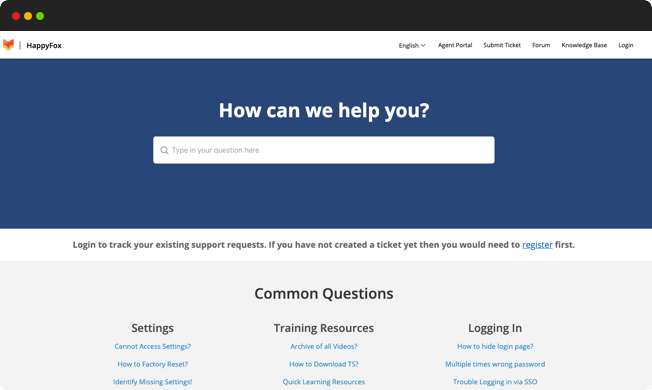
عبر هابي فوكس HappyFox هو برنامج قاعدة معرفية سهل الاستخدام يعمل كمنصة واحدة لجميع طلبات العملاء متعددة القنوات. يمكنك بسهولة تحويل طلبات البريد الإلكتروني، والهاتف، والدردشة، ووسائل التواصل الاجتماعي، وطلبات الويب إلى تذاكر والاحتفاظ بها منظمة في مكان واحد.
تشتهر HappyFox بقدراتها متعددة اللغات التي تتيح لك دعم عملائك من جميع أنحاء العالم. يمكن للمستخدمين بسهولة إنشاء مقالات قاعدة الدعم بلغات متعددة وتقديم المساعدة على مدار الساعة.
الميزات الرئيسية لـ HappyFox
- إنشاء أي نوع من المحتوى وإدارته باستخدام نظام إدارة المحتوى المدمج
- إبقاء كل عضو من أعضاء الفريق على اطلاع دائم بالإشعارات التلقائية
- الاستفادة من روبوتات الدردشة المدعومة بالذكاء الاصطناعي لتحويل تذاكر الدعم
- تنظيم التذاكر بشكل أفضل مع فئات التذاكر المحددة مسبقاً
- إنشاء ردود مُعلَّبة للرد على العملاء بنقرة واحدة
محترفو هابي فوكس #### محترفو هابي فوكس
- اقتراحات بحث يتم إنشاؤها تلقائياً
- مُحسَّن بالكامل للأجهزة المحمولة (iOS وAndroid)
سلبيات HappyFox
- الدعم الهاتفي متاح فقط مع باقة Enterprise Plus
- الباقات الأساسية تفتقر حتى إلى دعم البريد الإلكتروني
تسعير هابي فوكس
- القوية: 26 دولارًا للوكيل شهريًا
- الرائعة: 39 دولارًا للوكيل شهريًا
- المؤسسات: 52 دولارًا للوكيل شهريًا
- إنتربرايز بلس: 64 دولارًا للوكيل شهريًا
تقييمات عملاء هابي فوكس #### تقييمات عملاء هابي فوكس
- G2: 4.5/5 (3 تقييمات)
- كابيترا: غير متاح
كيفية اختيار حلول برمجيات قاعدة المعرفة المناسبة
اختيار أفضل برامج قاعدة المعرفة يعني أن تكون غير متردد بشأن الميزات التي تريدها.
تتضمن الأداة القوية جميع ميزات أداة قاعدة المعرفة القياسية. ولكن لكي تكون ضمن قائمة أفضل 3 أدوات، يجب أن تتخطى ذلك.
وقد سمح تجنب التصميم القديم، وإضافة ميزات جديدة بين الحين والآخر، والالتزام بقيمنا لـ ClickUp بالتفوق في سوق شديدة التنافسية.
على سبيل المثال، أي متنافسين حقيقيين على المركز الأول في قائمتك سيحتاجون إلى أن يكون لديهم
- محرر سهل على الإنترنت للكتابة والتحرير والتصميم بدون متاعب
- نظام تحكم في الوصول وإمكانيات إدارة الأدوار
- قواعد معرفية داخلية وخارجية قابلة للبحث
- تصميم بسيط وبديهي للغاية
- نظام قوي لإعداد التقارير
- تطبيق ملائم للهاتف المحمول
- تكامل مع جهات خارجية
- أسعار معقولة
- أمان البيانات
_هل نطلب الكثير من أداة قاعدة معرفية واحدة؟
_استسلم لحواسك العنكبوتية واكتفِ بالأداة رقم 1 في هذه القائمة. اشكرنا لاحقًا!
أنواع برامج إدارة المعرفة
قواعد المعرفة الداخلية
قواعد المعرفة الداخلية هي مستودعات لمعلومات الشركة التي لا يستطيع الوصول إليها سوى الموظفين. يتم استخدامها لإعداد الموظفين وتدريبهم وكأداة مرجعية.
قواعد المعرفة الخارجية
تشير قواعد المعرفة الخارجية إلى قاعدة بيانات معلومات الشركة المتاحة للعملاء أو العملاء. من خلال توفير قاعدة معرفية خارجية، يمكن للشركات تقليل تكاليف خدمة العملاء وتحسين رضا العملاء من خلال السماح للعملاء بالخدمة الذاتية لمشاكلهم.
قواعد المعرفة العامة
قواعد المعرفة العامة هي أنظمة قواعد معرفية يمكن الوصول إليها مجانًا ولا تتطلب بيانات اعتماد تسجيل الدخول. إنها مورد ممتاز للأشخاص الذين يبحثون عن معلومات حول موضوع معين ولكنهم ليسوا بالضرورة عملاء أو موظفين في الشركة.
ارتقِ بقاعدة المعرفة الخاصة بك إلى المستوى التالي
يجب أن تقلل قاعدتك المعرفية من أوقات التدريب، وتكمل مكتب الخدمة وتخزين معلومات الشركة بأمان لاستخدامها في المستقبل.
وبينما يمكن أن يساعدك برنامج قاعدة المعرفة في بناء مستودع الأحلام، فلا فائدة من الحصول على أداة تزيد من تعقيد العملية.
لهذا السبب تحتاج إلى ClickUp.
بفضل القدرات التنظيمية المفصلة، وميزات تنسيق المستندات من المستوى التالي، وخيارات مشاركة المعرفة المتقدمة، فإن ClickUp لديه كل ما تحتاجه لحل قاعدة المعرفة. احصل على ClickUp مجاناً اليوم لتحقيق جميع أهداف إدارة قاعدة المعرفة الخاصة بك!


